
Are you searching for a 2-year bachelor degree… wondering if it’s even possible to finish your degree in 2 years?
Editorial Listing ShortCode:
List of Online Bachelor’s Degree Completion Programs
Want to finish your bachelor’s degree fast? Check out these accredited colleges and universities offering online bachelor degree completion programs (which can usually be completed in 2 years or less).
| Rank | University | Featured Image | tbl-programs | Location | mdgtbl-description | |
|---|---|---|---|---|---|---|
Azusa Pacific University |
PROGRAMOnline
|
LOCATIONCalifornia
|
ACCREDITATIONWSCUC
|
APU is accredited by the WASC Senior College and University Commission.
|
||
Ball State University |
PROGRAMOnline
|
LOCATIONIndiana
|
ACCREDITATIONHLC
|
Ball State‘s continuing institutional accreditation by the Higher Learning Commission was reaffirmed on January 14, 2014, following a two-year self-study process.
|
||
Boston University |
PROGRAMOnline
|
LOCATIONMassachusetts
|
ACCREDITATIONNECHE
|
BU is accredited by the New England Commission of Higher Education.
|
||
Brescia University |
PROGRAMOnline
|
LOCATIONKentucky
|
ACCREDITATIONSACSCOC
|
Brescia is accredited by the Southern Association of Colleges and Schools Commission on Colleges to award associate, baccalaureate, and master’s degrees.
|
||
California Baptist University |
PROGRAMOnline
|
LOCATIONCalifornia
|
ACCREDITATIONWSCUC
|
Cal Baptist is accredited by the WASC Senior College and University Commission.
|
||
California University of Pennsylvania |
PROGRAMOnline
|
LOCATIONPennsylvania
|
ACCREDITATIONMSCHE
|
Cal U is a public university accredited by the Middle States Commission on Higher Education.
|
||
Central Washington University |
PROGRAMOnline
|
LOCATIONWashington
|
ACCREDITATIONNWCCU
|
CWU is currently an accredited institution through the Northwest Commission on Colleges and Universities.
|
||
Champlain College |
PROGRAMOnline
|
LOCATIONVermont
|
ACCREDITATIONNECHE
|
Champlain is accredited by the New England Commission of Higher Education.
|
||
Concordia University – Chicago |
PROGRAMOnline
|
LOCATIONIllinois
|
ACCREDITATIONHLC
|
CUChicago is accredited by the Higher Learning Commission to award baccalaureate, master’s and doctoral degrees.
|
||
CUNY School of Professional Studies |
PROGRAMOnline
|
LOCATIONNew York
|
ACCREDITATIONMSCHE
|
CUNY SPS is accredited by the Middle States Commission on Higher Education.
|
||
Dallas Baptist University |
PROGRAMOnline
|
LOCATIONTexas
|
ACCREDITATIONSACSCOC
|
DBU is accredited by the Southern Association of Colleges and Schools Commission on Colleges to award associate, bachelor’s, master’s, and doctoral degrees.
|
||
Drexel University |
PROGRAMOnline
|
LOCATIONPennsylvania
|
ACCREDITATIONMSCHE
|
Drexel is accredited by the Middle States Commission on Higher Education.
|
||
East Carolina University |
PROGRAMOnline
|
LOCATIONNorth Carolina
|
ACCREDITATIONSACSCOC
|
ECU is accredited by the Commission on Colleges of the Southern Association of Colleges and Schools to award bachelor’s, master’s, and doctoral degrees.
|
||
Florida State College – Jacksonville |
PROGRAMOnline
|
LOCATIONFlorida
|
ACCREDITATIONSACSCOC
|
FSCJ is accredited by the Southern Association of Colleges and Schools Commission on Colleges to award the baccalaureate and associate degree.
|
||
Florida State University |
PROGRAMOnline
|
LOCATIONFlorida
|
ACCREDITATIONSACSCOC
|
FSU is accredited by the Southern Association of Colleges and Schools, Commission on Colleges to award associate, baccalaureate, master’s, specialist, and doctoral degrees.
|
||
Fort Hays State University |
PROGRAMOnline
|
LOCATIONKansas
|
ACCREDITATIONHLC
|
Both the traditional FHSU and its Virtual College are regionally accredited by the Higher Learning Commission of the North Central Association of Colleges and Schools.
|
||
George Washington University |
PROGRAMOnline
|
LOCATIONWashington, D.C.
|
ACCREDITATIONMSCHE
|
GW is accredited by the Middle States Commission on Higher Education.
|
||
Huntington University |
PROGRAMOnline
|
LOCATIONIndiana
|
ACCREDITATIONHLC
|
Huntington is accredited by the Higher Learning Commission.
|
||
Immaculata University |
PROGRAMOnline
|
LOCATIONPennsylvania
|
ACCREDITATIONMSCHE
|
Immaculata is currently granted accreditation by the Middle States Commission on Higher Education.
|
||
Indiana University |
PROGRAMOnline
|
LOCATIONIndiana
|
ACCREDITATIONHLC
|
IU is accredited by the Higher Learning Commission.
|
||
Indiana Wesleyan University |
PROGRAMOnline
|
LOCATIONIndiana
|
ACCREDITATIONHLC
|
IWU is accredited by The Higher Learning Commission and is a member of the North Central Association of Colleges and Schools.
|
||
Kansas State University |
PROGRAMOnline
|
LOCATIONKansas
|
ACCREDITATIONHLC
|
K-State has been continuously accredited by the Higher Learning Commission (HLC) of the North Central Association of Colleges and Schools since 1916.
|
||
Lamar University |
PROGRAMOnline
|
LOCATIONTexas
|
ACCREDITATIONSACSCOC
|
Lamar is accredited by the Southern Association of Colleges and Schools Commission on Colleges to award associate, baccalaureate, masters, and doctorate degrees.
|
||
Lewis University |
PROGRAMOnline
|
LOCATIONIllinois
|
ACCREDITATIONHLC
|
Lewis is accredited by, and a member of, the Higher Learning Commission.
|
||
Loyola University – Chicago |
PROGRAMOnline
|
LOCATIONIllinois
|
ACCREDITATIONHLC
|
LUC is accredited by the Higher Learning Commission (HLC) and was first accredited in 1921.
|
||
Missouri State University |
PROGRAMOnline
|
LOCATIONMissouri
|
ACCREDITATIONHLC
|
MO State has been continuously accredited by the Higher Learning Commission since 1915.
|
||
Northeastern University |
PROGRAMOnline
|
LOCATIONMassachusetts
|
ACCREDITATIONNECHE
|
Northeastern is accredited by the New England Commission of Higher Education.
|
||
Northern Arizona University |
PROGRAMOnline
|
LOCATIONArizona
|
ACCREDITATIONHLC
|
The Higher Learning Commission accredits the NAU through 2027-2028.
|
||
Northern Kentucky University |
PROGRAMOnline
|
LOCATIONKentucky
|
ACCREDITATIONSACSCOC
|
NKU is accredited by the Southern Association of Colleges and Schools Commission on Colleges to award associate, baccalaureate, masters, and doctorate degrees.
|
||
Nova Southeastern University |
PROGRAMOnline
|
LOCATIONFlorida
|
ACCREDITATIONSACSCOC
|
NSU is accredited by the Southern Association of Colleges and Schools Commission on Colleges to award associate’s, baccalaureate, master’s, educational specialist, doctoral, and professional degrees.
|
||
Ohio State University |
PROGRAMOnline
|
LOCATIONOhio
|
ACCREDITATIONHLC
|
Ohio State has been accredited by the Higher Learning Commission (HLC) since 1913.
|
||
Ohio University |
PROGRAMOnline
|
LOCATIONOhio
|
ACCREDITATIONHLC
|
Ohio is accredited by the Higher Learning Commission.
|
||
Old Dominion University |
PROGRAMOnline
|
LOCATIONVirginia
|
ACCREDITATIONSACSCOC
|
ODU is accredited by the Southern Association of Colleges and Schools Commission on Colleges to award baccalaureate, masters, education specialist, and doctoral degrees.
|
||
Pace University |
PROGRAMOnline
|
LOCATIONNew York
|
ACCREDITATIONMSCHE
|
Pace is accredited by the Middle States Commission on Higher Education.
|
||
Penn State University |
PROGRAMOnline
|
LOCATIONPennsylvania
|
ACCREDITATIONMSCHE
|
Penn State is accredited by the Middle States Commission on Higher Education.
|
||
Rasmussen College |
PROGRAMOnline
|
LOCATIONMinnesota
|
ACCREDITATIONHLC
|
Rasmussen is accredited by the Higher Learning Commission.
|
||
Roberts Wesleyan College |
PROGRAMOnline
|
LOCATIONNew York
|
ACCREDITATIONMSCHE
|
Roberts is accredited by the Middle States Commission on Higher Education.
|
||
South Dakota State University |
PROGRAMOnline
|
LOCATIONSouth Dakota
|
ACCREDITATIONHLC
|
SDSU has been accredited by the Higher Learning Commission (HLC) since 1916 and underwent its most recent reaffirmation of accreditation in 2009-2010.
|
||
Southern Illinois University |
PROGRAMOnline
|
LOCATIONIllinois
|
ACCREDITATIONHLC
|
SIU is accredited by the Higher Learning Commission.
|
||
Thomas Edison State University |
PROGRAMOnline
|
LOCATIONNew Jersey
|
ACCREDITATIONMSCHE
|
TESU is accredited by the Middle States Commission on Higher Education.
|
||
University of Alabama – Birmingham |
PROGRAMOnline
|
LOCATIONAlabama
|
ACCREDITATIONSACSCOC
|
UAB is accredited by the Commission on Colleges of the Southern Association of Colleges and Schools to award bachelor’s, master’s, educational specialist, and doctoral degrees.
|
||
University of Arkansas |
PROGRAMOnline
|
LOCATIONArkansas
|
ACCREDITATIONHLC
|
UArk continues to be an accredited institution of higher education, following a decision by the Institutional Actions Council of the Higher Learning Commission.
|
||
University of Denver |
PROGRAMOnline
|
LOCATIONColorado
|
ACCREDITATIONHLC
|
DU is accredited by the Higher Learning Commission.
|
||
University of Florida |
PROGRAMOnline
|
LOCATIONFlorida
|
ACCREDITATIONSACSCOC
|
UF is regionally accredited by the Southern Association of Colleges and Schools.
|
||
University of Illinois – Chicago |
PROGRAMOnline
|
LOCATIONIllinois
|
ACCREDITATIONHLC
|
UIC is accredited by the Higher Learning Commission.
|
||
University of Illinois – Springfield |
PROGRAMOnline
|
LOCATIONIllinois
|
ACCREDITATIONHLC
|
UIS is accredited by the Higher Learning Commission.
|
||
University of Louisiana – Monroe |
PROGRAMOnline
|
LOCATIONLouisiana
|
ACCREDITATIONSACSCOC
|
ULM is accredited by the Southern Association of Colleges and Schools Commission on Colleges to award associate, baccalaureate, post-baccalaureate, masters, and doctorate degrees.
|
||
University of Massachusetts – Amherst |
PROGRAMOnline
|
LOCATIONMassachusetts
|
ACCREDITATIONNECHE
|
UMass Amherst is accredited by the New England Commission of Higher Education.
|
||
University of Minnesota |
PROGRAMOnline
|
LOCATIONMinnesota
|
ACCREDITATIONHLC
|
UMN is accredited by the Higher Learning Commission.
|
||
University of Missouri |
PROGRAMOnline
|
LOCATIONMissouri
|
ACCREDITATIONHLC
|
Mizzou has been continuously accredited by the Higher Learning Commission since 1915.
|
||
University of New Mexico |
PROGRAMOnline
|
LOCATIONNew Mexico
|
ACCREDITATIONHLC
|
UNM has been continuously accredited through the Higher Learning Commission (HLC) of the North Central Association since 1922.
|
||
University of North Carolina |
PROGRAMOnline
|
LOCATIONNorth Carolina
|
ACCREDITATIONSACSCOC
|
UNC is accredited by the Southern Association of Colleges and Schools.
|
||
University of North Texas |
PROGRAMOnline
|
LOCATIONTexas
|
ACCREDITATIONSACSCOC
|
UNT is accredited by the Southern Association of Colleges and Schools Commission on Colleges to award baccalaureate and master’s degrees.
|
||
University of South Carolina |
PROGRAMOnline
|
LOCATIONSouth Carolina
|
ACCREDITATIONSACSCOC
|
USC was most recently accredited by the Southern Association of Colleges and Schools Commission on Colleges in 2011.
|
||
University of South Florida |
PROGRAMOnline
|
LOCATIONFlorida
|
ACCREDITATIONSACSCOC
|
USF is accredited by the Southern Association of Colleges and Schools’ Commission on Colleges to award associate, baccalaureate, master’s, specialist and doctorate degrees.
|
||
University of Southern Mississippi |
PROGRAMOnline
|
LOCATIONMississippi
|
ACCREDITATIONSACSCOC
|
USM is accredited by the Southern Association of Colleges and Schools Commission on Colleges to award degrees at the baccalaureate, masters, specialists and doctoral levels.
|
||
Walsh University |
PROGRAMOnline
|
LOCATIONOhio
|
ACCREDITATIONHLC
|
Walsh is accredited by the Higher Learning Commission.
|
||
West Texas A&M University |
PROGRAMOnline
|
LOCATIONTexas
|
ACCREDITATIONSACSCOC
|
WTAMU is accredited by the Southern Association of Colleges and Schools.
|
||
West Virginia University |
PROGRAMOnline
|
LOCATIONWest Virginia
|
ACCREDITATIONHLC
|
WVU is accredited by the Higher Learning Commission, which guarantees the quality of the university as a whole.
|
||
Western Carolina University |
PROGRAMOnline
|
LOCATIONNorth Carolina
|
ACCREDITATIONSACSCOC
|
WCU is accredited by the Southern Association of Colleges and Schools Commission on Colleges to award baccalaureate, masters, and doctorate degrees.
|
||
Wisconsin Lutheran College |
PROGRAMOnline
|
LOCATIONWisconsin
|
ACCREDITATIONHLC
|
Degree programs at WLC are accredited by the Higher Learning Commission of the North Central Association of Colleges and Schools.
|
||
How to Get Your Bachelor’s Degree in 2 Years
There are four primary ways to get your bachelor’s degree faster:
- Bachelor degree completion programs
- Transfer credits
- Self-designed degree plan
- Universities that advertise “accelerated degree programs“
Can you finish your bachelor’s in 2 years? Yes, it’s possible… but it depends on you.
- Do you have any existing college credits?
- Are you willing to test out of a few classes?
- Do you have any applicable professional training or military experience that may be worthy of college credit?
- Do you feel comfortable taking classes online?
- Can you handle the pace of accelerated classes?
In this guide, I will let you in on some insider secrets to finishing faster, but the first step in this process is to select a university that offers accelerated online courses.
Graduate Faster with Accelerated Classes
If you want to finish your degree in less time, the first step is to select a college with accelerated courses.
- Choose a college that offers 5 week, 6 week, or 8 week online classes here.
Your actual time to completion will vary. It depends on the number of college credits you already have and how many classes you are able to handle at one time.
Remember, none of these schools guarantee a faster completion rate.
Each university will tell you what’s required to graduate. Then, you fulfill those requirements using a variety of methods outlined in this guide.

Most universities expect you to complete your degree in 4 years: freshman, sophomore, junior and senior years.
If you go the traditional route, 4 years in a university will take:
- $42,240 (public in-state) or $150,600 (private non-profit)
- 1,800 hours of in-classroom instruction
- 3,600 hours of work outside of the classroom
Who has time for that??
I’m going to show you how to create a self-designed degree plan that can help you to finish your bachelor’s faster…

2 Year Bachelor Degree Programs
A Step-by-Step Guide
A number of students would like to know how to graduate college in 2 years. Getting a bachelor’s degree in 2 years is a real thing. You can make it happen.
Keep in mind, the how-to is the best kept secret in academia:
- You are not changing your bachelor’s degree requirements.
- You are changing the speed. To wicked fast.
A bachelor’s degree will typically take 4 years of sitting in class.
But testing out of classes (credit by exam) and 8-week online classes are the turbo-boost needed to finish your bachelor’s degree in 2 years.
You still complete a freshman, sophomore, junior, and senior year. You just do it in half the time!
- You are no longer restricted by time and place.
- You can take classes from anywhere at anytime. Mind blown! It’s like giving you time-travel skills.
Here’s the challenge: There are no accredited colleges that will advertise a 2-year bachelor degree… but that DOES NOT keep you from finishing in 2 years.
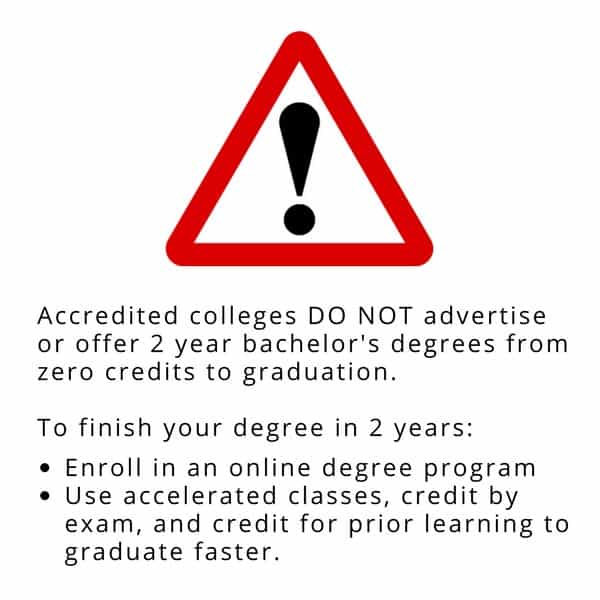
Accredited colleges may offer a 2-year degree completion program. But in order to enroll in a degree completion program, you must already have a pile of college credits under your belt. If you do, then the school will help you finish your degree in 2 years.
But if you are starting with no college credits, you will be looking to complete your entire bachelor’s degree from zero to finish.

Pro tip: You can make any traditional online degree program into a 2-year bachelor’s degree if you pick the right school.
How to Get a Bachelor’s Degree in 2 Years
Welcome to square one!
You have no credits. Yet. But you are going to be done with your bachelor’s degree in 2 years with these 3 simple steps.
Step 1: Get college credit without sitting in class
Getting college credit by going to class is so 1980s. Like scrunchies and slouch socks.
I’m going to give you 2 other options for getting credit for a year (or more) of college before you even start.
I know where you are coming from. Sitting in class is horrible when your to-do list is 3 feet long, your toddler is sick, and your bills are stacking up.
Testing out of college classes
All bachelor’s degree programs will have a list of general education requirements. They are similar from state to state.
These general education classes can be mind-numbingly boring, but everybody has to take them.
Except for you. Because you are smart.
Instead of taking classes, you take an exam that proves you already know the material AND you get credit for it.
Pro tip: You do not have to ace the exam to get college credit. Most schools just require a 50% score to give you credit for the class!

How to test out of up to 1 year of college classes:
- Choose an exam to take and register via the exam website.
- Pay your registration fee.
- Grab a study guide and cram, cram, cram. May require large amounts of coffee.
- Schedule a time to take the exam at the test center.
- Take that exam and get a passing score.
- Enjoy the credits you just earned without going to class!
Just like that.
How to Skip Classes and Still Get College Credit
Let’s say you are getting a degree at Texas A&M University. Here’s a list of the general education courses you need and the matching exams that you can do with the College Level Examination Program (CLEP) to earn credit without going to class.
| General Education Requirements | College Level Examination Program (CLEP) Exam |
| Communication – 6 credits | College Composition – 6 credits |
| Mathematics – 3 credits | College Algebra – 3 credits |
| Life and Physical Sciences – 6 credits | Biology – 6 credits |
| Language, Philosophy and Culture – 3 credits | Western Civilizations I – 3 credits |
| Creative Arts – 3 credits | Humanities – 3 credits |
| American History – 6 credits | History of the United States I/II – 6 credits |
| Government/Political Science – 6 credits | American Government – 3 credits (Texas requires a course in Texas history)
May need to take a Political Science exam through Excelsior – 3 credits |
| Social and Behavioral Science – 3 credits | Introductory Psychology – 3 credits |
| Institution option – 6 credits | Principles of Management – 3 credits
Principles of Marketing – 3 credits |
Did you see that?
You can get ALL your general education requirement credits through Credit by Exam. Your whole freshman year and half of your sophomore year could be done before you even go to class.
Check your college’s fine print before you take an exam
Over 3,000 universities accept credit by exam, but each college sets its own policies such as minimum passing score, which exams they will honor, and the maximum number of college credits that can be earned by exam.
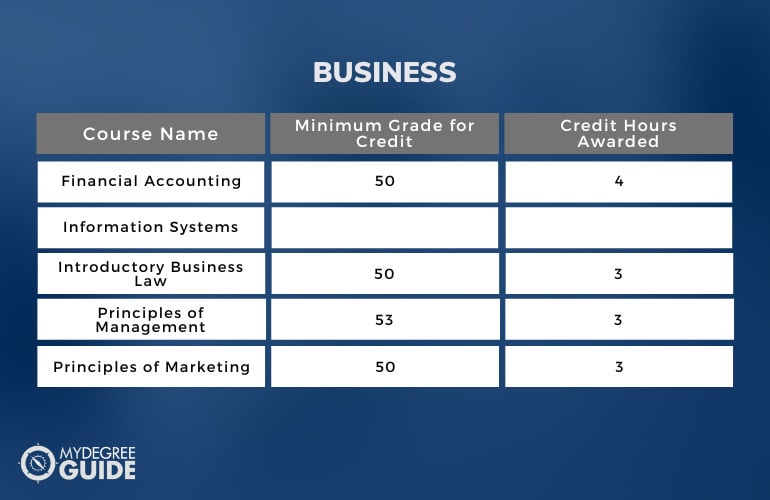
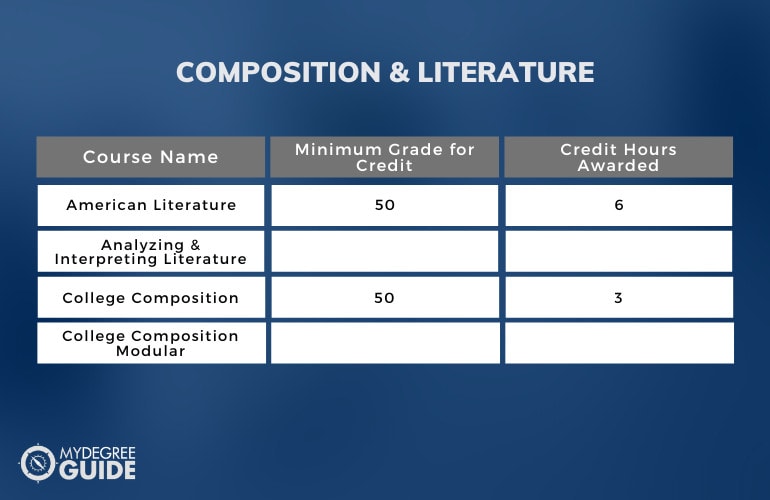
To give you an idea, Liberty accepts up to 30 credit hours in exam credit. That’s an entire year of college! Be sure to check your destination college’s academic catalog to make sure you are up to speed on their policies before you take an exam.
Companies Administering Exams for College Credit
There are 5 exams that offer Credit by Exam. The most-widely accepted exams are CLEP exams which are honored by over 3,000 colleges.
- CLEP – 33 exams available
- DSST – 34 exams available
- Thomas Edison State Credit – 38 exams available
- Excelsior College Exams – 52 exams available
- New York University Language Exams – 12 credits in 50 languages
Isn’t that amazing?
These Credit by Exam programs each have more than 30 exams.
You can get between 3 to 6 credits for each exam. Most of the CLEP exams are multiple-choice and are completed in 90 minutes!
As I mentioned, Liberty University will allow you to take up to 30 credits via CLEP exams. Most of the schools I’ve encountered accept between 18-30+ credits by exam.
The beauty of this approach is you don’t have to get 100% on an exam. At most schools, all you need is a score of 50% and you get credit for the class. Sure beats sitting in class for 16 weeks, don’t ya think?
College Credit for Life and Work Experience
The National Center for Education Statistics reports that the age of college students is on the rise. There were over 8.2 million students over 25 years old who were attending college.
So what have you been up to the last few years?
Maybe you were working in law enforcement or health care, traveling, or piloting a plane. Those experiences count. You can make them count in a big way now that you have started college by using your experiences for college credit.
Credit for Prior Learning
Using Liberty as an example, you can receive credit for prior learning either by submitting a portfolio or through your credentials.
Look carefully at this list of skill sets and see how many you have. Each one could potentially earn you college credit.
Skills that Translate into College Credit for Prior Learning:
- Administration
- Early Childhood Education
- Management
- Nursing
- Public Speaking
- Aviation
- Emergency Medical Technician
- Hospitality Management
- Payroll
- Real Estate
- Banking
- Evangelism
- Human Resources
- Property Management
- Supervisory Experience
- Border Patrol
- Flight Attendant
- Insurance
- Pharmacy Technician
- Sign Language Interpretation
- Corrections
- Facilities Management
- Law Enforcement
- Project Management
- Teaching English as a Foreign Language
- Counseling
- Financial Planning
- Legal Secretary
- Property Management
- Youth Ministry
Did you notice how frequently management appears on this list? If you have worked your way up to management, you may be able to get credit for that.
Also, healthcare. Hello EMT, nurses, pharmacy techs.
What about those of you working to keep us safe? Border patrol, corrections, and law enforcement. You may be eligible for college credit, too.
Let’s not forget those with the math brains! Bankers, financial planners, insurance, payroll.
And we won’t forget the world travelers in the group. Pilots, flight attendants, ESL teachers.
Obviously, each university has the final say in what they deem worthy of receiving college credit for prior learning.
How to Get Your Credit for Prior Learning
You take your professional or military experience and create a portfolio.
I will use Liberty as an example:
- Select a class you think you already know all the material for.
- Answer 5 questions specific to the class you are requesting credit for.
- Add documents, letters of verification from supervisors, certificates, diplomas, transcripts, job evaluations, work samples, newspaper clippings, and your resume.
- Pay the $100 portfolio fee and wait 5 days to see if you get approved.
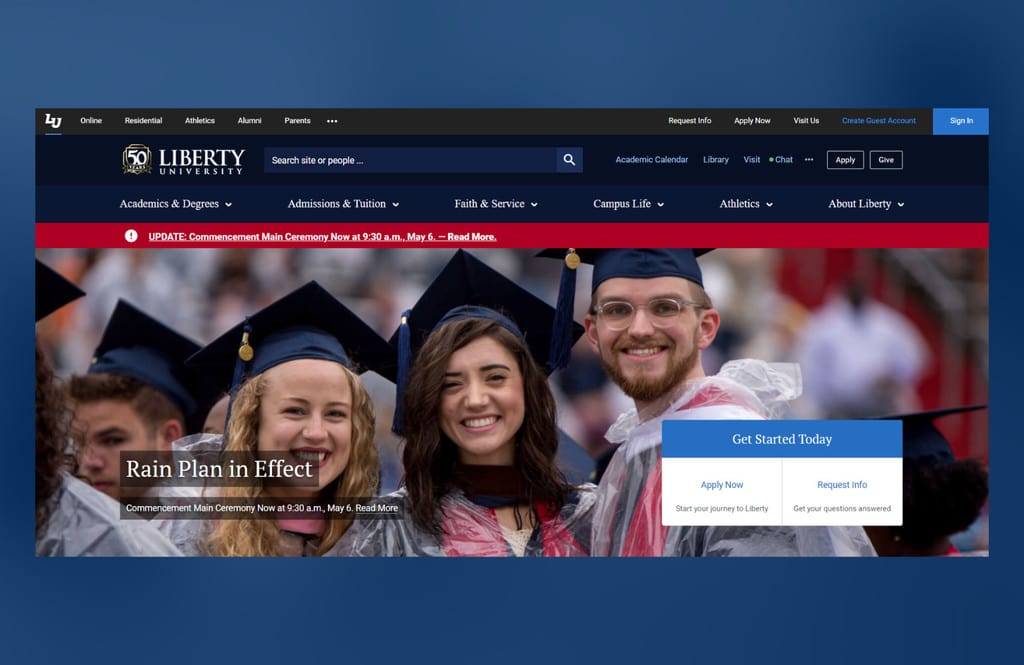
There is no guarantee you will get credit for each portfolio. The only guarantees in life are death and taxes.
If you have legitimate experience after high school, you may be able to get credit for something.
What is there to lose in trying?
Step 2: Attend a university offering accelerated online classes
There are 2 types of class schedules: traditional and accelerated. It is like choosing between decaf or caffeinated coffee. One will make you go a lot faster!

Accelerated online classes are classes offered online.
You will read your textbook, watch lectures, write papers, and participate with your classmates on the virtual discussion board.
Although the assignments you complete are similar, online classes allow you to log in after work, on your lunch hour, whenever it’s convenient for you. That might mean you are watching a lecture at 1 am after working a late shift or getting up early to finish your class before the kids wake up.
With online classes, you don’t have to put your life on hold. You work the classes into your life when it’s most convenient for you.
How does it work?
First, pick a college that offers 5-week, 6-week, or 8-week classes online.
You can take 18 credit hours, about 6 classes for each fall, spring, and summer semester. So, in 12 months you would have 54 credits! Most students would have 30 credits after sitting in (and paying for!) classes for a year.
But if you like your education caffeinated with a shot of espresso and you can keep your GPA (grade point average) above 3.5, you can even petition to get approval to take 4 classes (12 credit hours) every 8 weeks at some universities.
That would be CRAZY! And really hard! You would be running like a caffeinated squirrel, but I’d do it if someone gave me the green light!
Earning up to 72 credits in 12 months.
That is double the regular speed.
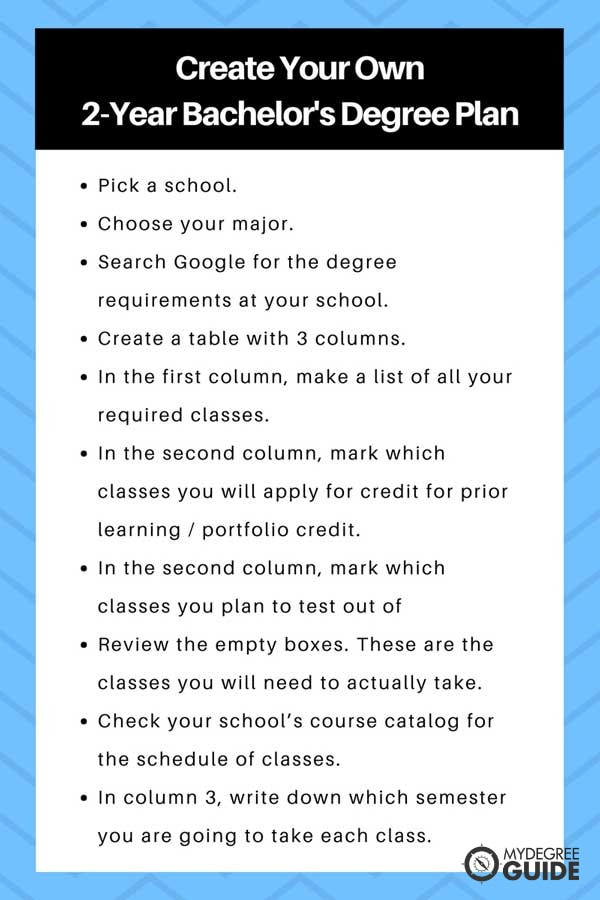
Step 3: Create your own accelerated degree plan
So, there are no “official” 2-year bachelor degree programs.
But you’re in charge of your education, right?
Let’s make a custom fit 2-year bachelor degree program for you.
You don’t need to follow a traditional plan. But you do need to be done in 2 years. We can make this happen.
- Grab a cup of coffee. Life is always easier with coffee.
- Pick a school. Really, that’s where we start: Colleges offering accelerated classes online.
- Choose your degree. I’m going for Business Administration.
- Open up a browser window and search for your degree requirements. Go to Google, type in the name of your university, your desired major, and “degree requirements”.
- Click on “degree requirements” or “degree completion plan”.
- Create a table with 3 columns. Either on your computer or a scrap piece of paper.
- In the first column make a list of ALL the classes you need. Your college might say you need 40 classes for 120 credits.
- Compare your class list against the list of Credit for Prior Learning.
- I found 105 Business courses that I can use to apply for credit with a portfolio. Now, I just need to narrow down the list.
- Mark in the second column of your class list which classes you are going to try to get Credit for Prior Learning for.
- Check the CLEP website to see which classes you can test out of. In the second column, write “take exam” next to each class you are going to test out of.
- Review the empty boxes. All the empty boxes in column 2 are the classes you will need to take now. Doesn’t that look better already?
- Check your school’s course catalog for the schedule of classes. Some classes will be available all the time, some will be rotated through fall, spring, and summer. Choose the rotated ones first. You don’t want to slow yourself down having to wait until the next spring to take the last class you need because you didn’t take it on the first rotation.
- In the third column, write down when you are going to take each class. Be very thorough! Make sure each class is accounted for.
- Now finish your coffee. Take a deep breath, sit back, and finish that last bit of your now cold coffee. In less than an hour, you have created a blueprint that will let you finish an entire bachelor’s degree in 2 years.
That’s it. It wasn’t all that hard, right?
Sample Timeline: How to Get Your Bachelor’s Degree in 2 Years
You should know how quick you finish does depend on where you start. To help you get your bachelor’s degree in 2 years I am going to break it down depending on where you are right now.
Whether this is your first time attending college or if you are coming back to college with a few credits. Or if you have already completed 2 years and have 60 credits already.
You can do this. Choose which one you are and let’s get that 2-year degree.
First-time college student: You have zero college credits
You are starting at square one. You’ve never taken a college course but you are going to rock this now!
I’ll continue our example of a college offering 8-week classes online with a 9 credit hour course load.
You can use ANY university you want to get your bachelor’s degree in 2 years. They just have to offer 8-week (or less) online classes and allow you to take 9 credit hours per term. Most only allow you to take 6 credit hours per term and that will slow you down considerably.
If you decide to ONLY take online accelerated classes and aren’t going to muck around with CLEP exams or Credit for Prior Learning, it will take you 2 years and 8 weeks.
| First-time college student with zero credit hours | ||
| Semester | Semester Length | Number of classes/credit hours |
| Fall 1 | 8 weeks | 3 classes x 3 credit hours = 9 credit hours |
| Fall 1 | 8 weeks | 3 classes x 3 credit hours = 9 credit hours |
| Spring 1 | 8 weeks | 3 classes x 3 credit hours = 9 credit hours |
| Spring 2 | 8 weeks | 3 classes x 3 credit hours = 9 credit hours |
| Summer | 6 classes x 3 credit hours = 18 credit hours | |
| Fall 1 | 8 weeks | 3 classes x 3 credit hours = 9 credit hours |
| Fall 2 | 8 weeks | 3 classes x 3 credit hours = 9 credit hours |
| Spring 1 | 8 weeks | 3 classes x 3 credit hours = 9 credit hours |
| Spring 2 | 8 weeks | 3 classes x 3 credit hours = 9 credit hours |
| Summer | 6 classes x 3 credit hours = 18 credit hours | |
| Fall 1 | 8 weeks | 4 classes x 3 credit hours = 12 credit hours |
| Bachelor’s degree completed: 120 credit hours | ||
Fast?
Yep, it sure is.
But that is just a little bit fast. If we put some more caffeine in your degree program, we could knock off 1 more year. Having you at zero to done in 1 year and 8 weeks.
Here are 10 introductory level exams you can take to earn 30 credits in 1 year.
- American Literature: 3 credits
- College Composition: 3 credits
- American Government: 3 credits
- Introductory Sociology: 3 credits
- Human Growth and Development: 3 credits
- Natural Sciences: 3 credits
- Information Systems: 3 credits
- Introductory Business Law: 3 credits
- Principles of Management: 3 credits
- Principles of Marketing: 3 credits
You can be done your degree in the time it takes Apple to release a new iPhone. Now that’s an upgrade!
Returning college student with less than 59 credits hours completed
You’ve already been around the board, but you still need to finish your degree. This time you are going to knock it out of the park.
Life has a funny way of providing motivation as you get older.
If you already have 30 credits tucked away, you can be done in 1 year and 32 weeks just by taking online accelerated classes.
| Returning college student who has earned 30 credit hours already | ||
| Semester | Semester Length | Number of classes/credit hours |
| Transfer credits | 30 credit hours | |
| Fall 1 | 8 weeks | 3 classes x 3 credit hours = 9 credit hours |
| Fall 1 | 8 weeks | 3 classes x 3 credit hours = 9 credit hours |
| Spring 1 | 8 weeks | 3 classes x 3 credit hours = 9 credit hours |
| Spring 2 | 8 weeks | 3 classes x 3 credit hours = 9 credit hours |
| Summer | 6 classes x 3 credit hours = 18 credit hours | |
| Fall 1 | 8 weeks | 3 classes x 3 credit hours = 9 credit hours |
| Fall 2 | 8 weeks | 3 classes x 3 credit hours = 9 credit hours |
| Spring 1 | 8 weeks | 3 classes x 3 credit hours = 9 credit hours |
| Spring 2 | 8 weeks | 3 classes x 3 credit hours = 9 credit hours |
| Bachelor’s degree completed: 120 credit hours | ||
That’s a decent pace. But I bet you want to go faster.
What do you say to just over a year to being done with your bachelor’s degree? You can do that!
You can knock 30 credits off by testing out of classes and submitting credit for a prior learning portfolio.
You probably already have credit for some of the introductory courses, but what about:
- Analyzing and Interpreting Literature: 3 credits
- Humanities: 3 credits
- History of the United States I/II (two exams): 6 credits
- Principles of Macroeconomics: 3 credits
- Principles of Microeconomics: 3 credits
- Western Civilization I/II (two exams): 6 credits
- Chemistry: 3 credits
- Precalculus: 3 credits
If there is any class that you haven’t already taken that is available through the College Level Examination Program (CLEP), go ahead and test out of the class. That is your fastest option to getting credit.
If you take full advantage of the online accelerated classes, Credit by Exam, and Credit for Prior Learning, you could start this September and be done by next November. 1 year, 8 weeks.
Returning college student with 60 credit hours completed
You’ve started and you are halfway done. Let’s get you through the second half of your degree.
Most likely you have all your freshman and sophomore introductory courses done. Now you are needing the higher level credits. The 300 and 400 level courses.
If you go like crazy and do the online, accelerated classes, you can be done in 1 year and 8 weeks. Not too bad.
| Returning college student who has earned 60 credit hours already | ||
| Semester | Semester Length | Number of classes/credit hours |
| Transfer credits | 60 credit hours | |
| Fall 1 | 8 weeks | 3 classes x 3 credit hours = 9 credit hours |
| Fall 1 | 8 weeks | 3 classes x 3 credit hours = 9 credit hours |
| Spring 1 | 8 weeks | 3 classes x 3 credit hours = 9 credit hours |
| Spring 2 | 8 weeks | 3 classes x 3 credit hours = 9 credit hours |
| Summer | 6 classes x 3 credit hours = 18 credit hours | |
| Fall 1 | 8 weeks | 2 classes x 3 credit hours = 6 credit hours |
| Bachelor’s degree completed: 120 credit hours | ||
You still want to go faster though, right? You can see the finish line and you just want to be done.
It can be done faster.
CLEP exams won’t usually give you those higher-level credits. But there are a few exceptions. Beautiful exceptions!
Here are 2 exams that are 300/400 level courses with CLEP:
- Business Law: 3 credits
- Principles of Marketing: 3 credits
Excelsior College does offer higher-level courses, but make sure that they will fulfill your major requirements.
3 exams you can take at Excelsior that are at the 300/400 level are:
- Operations Management: 3 credits
- Organizational Behavior: 3 credits
- Human Resource Management: 3 credits
As you are getting to the end of your degree, the required courses become more specific. But if there is an option to test out of elective credits at this level. Do it! It will still help you finish faster.
All colleges have a minimum number of classes you have to take with that school to be granted a degree. Most refer to this as a residency requirement. For Liberty, the requirement is 50% of your classes in your major must be completed at the university.
If your degree requirements still have some wiggle room to test out of courses and you complete five 300/400 level exams, you could be done in 11 months. Less than a year. And you would still have time for summer vacation.
Bachelor Degree Completion Programs
Bachelor degree completion programs do exist. These are what most colleges are referring to when they say they have a 2-year bachelor degree program. They aren’t doing you any favors. They are just accepting your college credits. Any accredited university will do that for you.
Bachelor’s degree completion programs are meant to help you finish a degree that you already started. You already have the credit or an associate degree. Now you need a bachelor’s degree.
They would work for you if:
- You already have existing credit, usually at least 60 hours
- You have completed 2 years or an equivalent of study
A college that offers an online bachelor’s degree completion program allows you to finish a degree by transferring your existing credit to the degree you want. They also offer online and accelerated classes.
How you do this is pretty basic:
- Apply to the college
- Submit your transcripts
- Wait to be accepted
- Once accepted, meet with your program advisor to outline your roadmap to graduation
Even in a bachelor’s degree completion program, you can still use credit by exam and credit for prior learning. Talk to your advisor and make a plan!
Taking the next step
What do you think? 2 years from zero to done.
2 years of hard work using the smart, detailed plan of action you laid out. Earning college credit without sitting in class, using accelerated classes, and your own actionable degree plan.
It’s all ready to go. Does the thought of being done in 2 years motivate you to jump in?
You can take the customized accelerated degree plan you made and write your end date on there.
Look at that date. It’s not that far in the future. Maybe 2 years and 8 weeks. Maybe less than a year.
You could be holding your bachelor’s degree.
